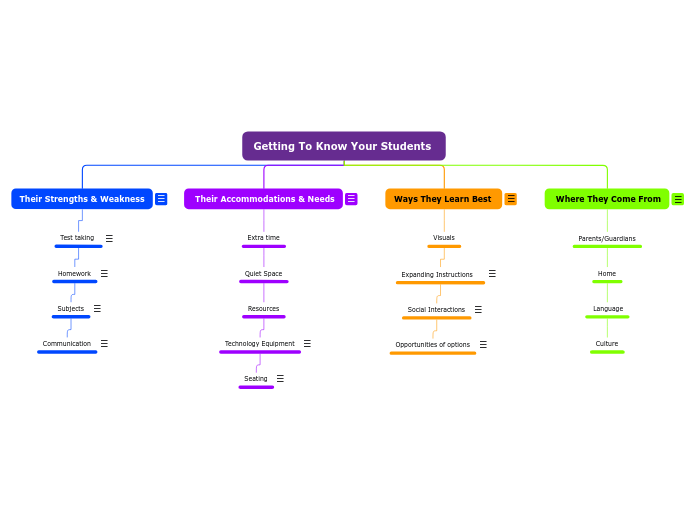Getting To Know Your Students
Their Strengths & Weakness
Knowing a student's strengths and weakness is very important because if you are able to understand the student's weakness then you can incorporate extra support for the student in your instructional practices. You are also able to keep track of each student's progress from their weakness and strengths and see if they are advancing from their weakness when you give your practices.
Test taking
Many student struggle on test taking. It is not a surprise when student score low on test because test can be their weakness. You are able to understand what the student is struggling on from the test and you can get those scores and help you articulate a teaching practice that can help the student understand.
Homework
Although homework is mandatory for students to complete, as an educator you are able to see what the students are understanding and what they are struggling to complete.
Subjects
These subjects can be math, reading, writing, spelling, math, science and many others. Students can be stronger in one subject and be struggling in another subject.
Communication
Some students have strong vocabulary, language, and speaking skills than others and that helps them with communicating in general. This could be presentations, talking to other teachers, asking for help, and social interactions.
Their Accommodations & Needs
It is very important to know your student's accommodations and needs because this will support them in their learning. As an educator, you need to plan accordingly on your instructional practices because some student's might need an alternative.
Extra time
Quiet Space
Resources
Technology Equipment
Some students will need assistive technology, some examples are communication boards, wheelchairs, hearing aids, audible, text-to-speech, and etc.
Seating
Some student's will need a proper and reasonable seating place and chairs.
Ways They Learn Best
As an educator it is important to recognize the way your student's learn best. This is when planning your instructional practices, you will need to incorporate methods and strategies that you think your students will learn best from.
Visuals
Expanding Instructions
This means giving extra examples if student's did not understand the first time. Expanding/elaborating the information you are giving can help students have a better understanding.
Social Interactions
This means incorporating ways where student's can do group work because this can help student's learn from each other and some student might feel more comfortable collaborating work with others.
Opportunities of options
Some student's will demonstrate their understandings in different ways so it is important to give opportunities of options.
Where They Come From
As an educator, it is important to know your student's especially by where they come from. This mean their culture, language, race, status, and many other contributions. If you are aware of your students in this matter than you instructional practices will show respect and equity.
Parents/Guardians
Home
Language
Culture
